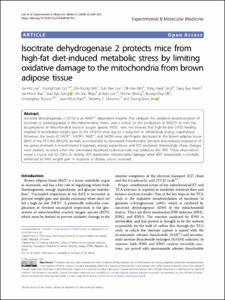Isocitrate dehydrogenase 2 protects mice from high-fat diet-induced metabolic stress by limiting oxidative damage to the mitochondria from brown adipose tissue
- Keimyung Author(s)
- Lee, Jae Ho; Kwon, Taeg Kyu; Bae, Jae Hoon; Song, Dae Kyu; Im, Seung Soon
- Journal Title
- Experimental and Molecular Medicine
- Issued Date
- 2020
- Volume
- 52
- Issue
- 2
- Abstract
- Isocitrate dehydrogenase 2 (IDH2) is an NADP+-dependent enzyme that catalyzes the oxidative decarboxylation of isocitrate to α-ketoglutarate in the mitochondrial matrix, and is critical for the production of NADPH to limit the accumulation of mitochondrial reactive oxygen species (ROS). Here, we showed that high-fat diet (HFD) feeding resulted in accelerated weight gain in the IDH2KO mice due to a reduction in whole-body energy expenditure. Moreover, the levels of NADP+, NADPH, NAD+, and NADH were significantly decreased in the brown adipose tissue (BAT) of the HFD-fed IDH2KO animals, accompanied by decreased mitochondrial function and reduced expression of key genes involved in mitochondrial biogenesis, energy expenditure, and ROS resolution. Interestingly, these changes were partially reversed when the antioxidant butylated hydroxyanisole was added to the HFD. These observations reveal a crucial role for IDH2 in limiting ROS-dependent mitochondrial damage when BAT metabolism is normally enhanced to limit weight gain in response to dietary caloric overload.
- Publisher
- School of Medicine (의과대학)
- Citation
- Jae-Ho Lee et al. (2020). Isocitrate dehydrogenase 2 protects mice from high-fat diet-induced metabolic stress by limiting oxidative damage to the mitochondria from brown adipose tissue. Experimental and Molecular Medicine, 52(2), 238–252. doi: 10.1038/s12276-020-0379-z
- Type
- Article
- ISSN
- 2092-6413
- Source
- https://www.nature.com/articles/s12276-020-0379-z
- 파일 목록
-
-
Download
 oak-2020-0309.pdf
기타 데이터 / 2.53 MB / Adobe PDF
oak-2020-0309.pdf
기타 데이터 / 2.53 MB / Adobe PDF
-
Items in Repository are protected by copyright, with all rights reserved, unless otherwise indicated.